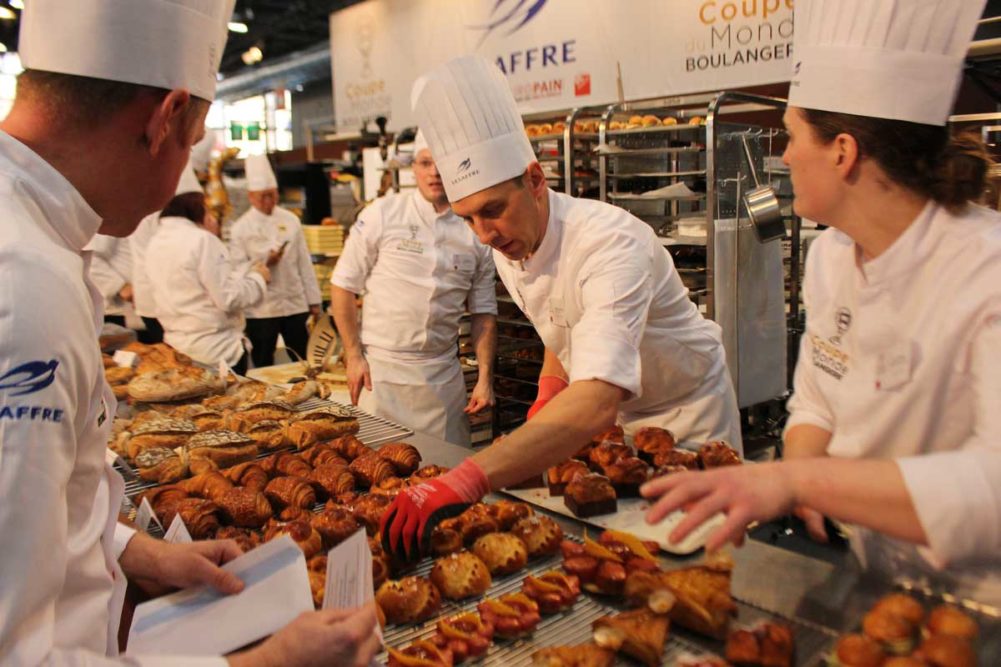PARIS — It may not have been the ending Team USA was looking for, but the experience was worth the work.
The team of bakers representing the United States at the 2020 edition of the Coupe du Monde de la Boulangerie, the World Cup of Baking, at Europain 2020 in Paris, walked away empty handed as China took home first place, followed by Japan then Denmark. It was China’s first time winning this competition.
Team USA, sponsored by the Bread Bakers Guild of America, competed next to 11 other countries in four categories: baguette and breads of the world, sweet baked goods, artistic creation, and gourmet baking.
The competition began on Jan. 11, when the team arrived at the Port de Versailles Expo Center at 4:30 a.m., ready to take on the madness of the next eight hours of baking. In that time, the team created a suite of baked foods, including traditional baguettes, pain zizzis, brioche a tetes, croissants, puff pastry and non-puff pastries. The theme of this year’s artistic creation was “Music from your country,” and the team chose to showcase New Orleans jazz in a towering piece of edible art.
One of the team’s signature creations was the “Billie Holiday,” which was a strawberry rhubarb non-puff pastry with lemon flavor.
Nicky Giusto of Central Milling was the team’s coach and oversaw the work of the young bakers. Jerod Pfeffer made the baguettes and world bread. Kate Goodpaster was in charge of the sweet baked goods and pastries, and Nicolas Zimmerman was the head of artistic design. Mr. Pfeffer is the co-owner of 460 Bread, Driggs, ID, while Ms. Goodpaster works for Patisserie46 and Rose Street bakeries in Minneapolis. Mr. Zimmerman is a French-born baker working for his father, Pierre Zimmerman, at La Fournette, in Chicago.
Once the baking began, the team was locked in.
“Every five minutes was planned out,” Mr. Giusto said. “We have things to do every five minutes and we tick those boxes as we go.”
With under 10 seconds left on the clock, the team embraced and celebrated completing this monumental task.
“They hustled, they spent every ounce of energy they could, and then some,” Mr. Giusto said of the team. “I’m really proud of how they performed.”
Being able to present so many products to the judges after eight hours of baking requires a lot of practice. The team performed timed trials in the week leading up to the competition and had been developing their products over the past year after a period of tryouts.
The practice sessions leading up to the competition consisted of product development and timed runs. So, to choose the right style of baguette, Mr. Giusto said, they would sometimes make 10 batches of baguettes in one day to determine the best.
“The time commitment is incredible, and if you have a spare moment, you’re thinking about the coupe,” Mr. Giusto said. “Your work can suffer too, so it’s really helpful to have an employer that understands how this will benefit you. Most are very supportive and supply resources to help you through it.”
The sacrifice to compete in this competition also is draining on the bakers’ family and friends, he explained. But the experience makes up for everything.
“You become family, you spend so many hours together with ups and downs of frustrations and successes,” he said. “It’s a set of emotions and relationships that I don’t know another event that conjures up that type of interaction with a group of humans.”
Professionally, the competition also offers many opportunities to improve skills and network with some of the best bakers in the world.
“You really get to fine-tune your skills as a technician solving problems in a bakery,” Mr. Giusto explained. “That’s something that will stay with them. And it’s incredibly important for careers is the comradery and the people you meet at the competition. The networking opens up doors.”
Not only do the competitors get to observe different techniques and methods, but they also share ideas. Whether it’s a new combination of flours in a bread or new technique for rolling baguettes, the ideas are shared and ultimately improve everybody’s craft.
“Looking at all the other countries work is inspiring for our day-to-day production,” Mr. Giusto said. “You have all these different cultures influencing their suite of products that they’re presenting, and we get to absorb all that along the way. That’s what this competition is about, celebrating our craft as bakers, celebrating what we’ve done, our accomplishments, and then sharing all that knowledge.”
In the end, Team USA walked away from the competition as winners, even if they didn’t end up on the podium or with a trophy. While placing in the top three was the ultimate goal, it wasn’t the only mission for the team.
“It doesn’t matter, really, because being here on this stage with 11 other countries is winning,” Mr. Giusto said. “That’s the pinnacle, just to be here. Being on one of those white boxes at the end is just icing on the cake.”






